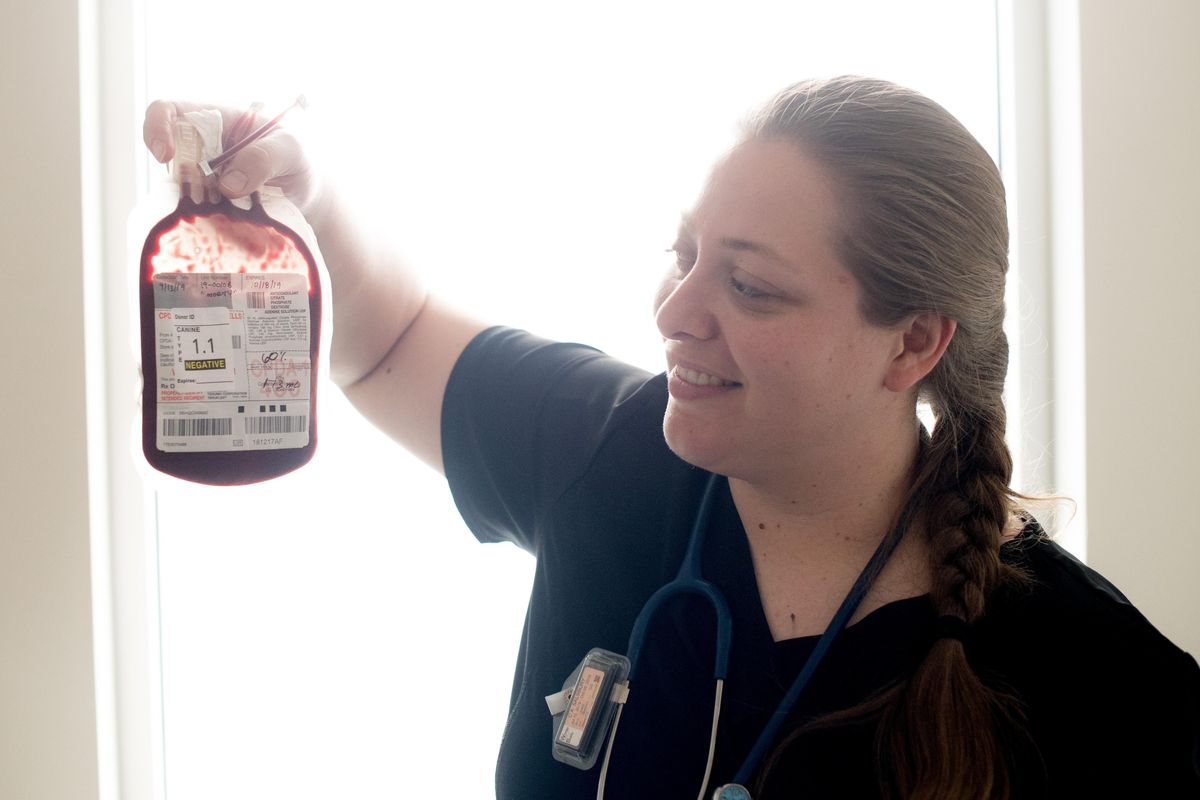Pet Emergency Clinic’s community blood bank saves canines’ lives

Buddy is a very good boy. He’s gentle, sweet-natured and obedient. He also saves lives. Buddy is a canine blood donor who belongs to Claressa Salsbury, lead veterinarian technician for internal medicine at the Pet Emergency Clinic in Spokane.
Salsbury oversees the canine community blood bank at the clinic. “We used to get commercial blood, but there’s a huge shortage,” said Salsbury. “The last time I tried to order from a commercial bank, there was a five-week wait.”
That kind of wait would have been too long for Louis, a Jack Russell terrier/beagle mix who became critically ill last month. “He wasn’t eating. He just wasn’t himself,” said Louis’ owner, Connie McLaughlin.
She took him to her regular vet where they discovered his red blood cell count was at 8%. A healthy dog’s count is 35% to 55%. “He was dying,” McLaughlin said.
Louis was diagnosed with an auto-immune disease, and his vet did a transfusion. It helped briefly, but when his numbers plummeted again, the vet recommended McLaughlin take Louis to the internal medicine department at the Pet Emergency Clinic.
With its state-of-the- art centrifuge and blood storage unit, the clinic is able to take donated blood and separate it into plasma and packed blood. Packed blood is rich in red blood cells, which is what Louis desperately needed.
Louis rallied after the transfusion at the clinic and is back to being his sweet, engaging self. His auto-immune disease is in remission, and he’s slowly being weaned off medication. “We weren’t ready to lose him,” McLaughlin said. “They saved his life.”
Salsbury is hoping to build the community blood bank up to the point where they don’t have to worry about trying to obtain commercially banked blood. To do that, the clinic will need more donors like Buddy.
There’s no breed restriction on donor dogs, but they must weigh 60 pounds or more. They also need to be between 1 and 6 years old. “No puppies or seniors,” said Salsbury.
And, most importantly, donor dogs need to be happy and healthy. “They need to be willing. I want them to be happy to come here,” said Salsbury. She sees new donor dogs twice before they donate.
“First we take a small sample for a blood-type test,” explained Salsbury. “Dogs have nine different blood types.” On the second visit, she does a wellness check and behavior assessment.
These visits are free of charge, and bloodwork, fecal testing analysis and heartworm testing results are sent to the dog’s regular veterinarian.
“If they’re not already on heartworm and flea and tick meds, I’ll provide those at no charge,” Salsbury said. “We want to make sure to give the best blood to our sick patients.”
The donation process takes 10 and 20 minutes, and pets are closely monitored the entire time. Donor dogs are given a big meal afterward, and Salsbury keeps an eye on them for about 20 minutes to ensure that all is well.
Owners can drop their pets off and pick them up later, or they can wait for them at the clinic. Canine donors can give blood as often as every four weeks, but Salsbury prefers to wait six to eight weeks between donations.
“I want to give them time to replenish their red blood cells,” she said. Dogs can require transfusions for a variety of reasons, including surgical complications, accidents and rat bait ingestion.
But like Louis, often it’s an auto-immune issue that prompts the need. That’s what happened to Sookie, Melissa Baker’s black lab. “She just got really sick one day,” Baker recalled. “We found out her body was rejecting red blood cells.”
Sookie was the first dog Baker had owned as an adult. “I thought I was going to have to put her down,” she said. However, a transfusion at the Pet Emergency Clinic made all the difference.
“That was in 2013,” Baker said. “She’s had a few hiccups along the way, but she seems happy and comfortable and loves to go on walks.” Baker recently added Guster, a Newfoundland, to their pack.
“Because of Sookie, I’m going to see if Guster is eligible to donate,” Baker said. That makes Salsbury happy. “There’s a constant need,” she said. “The more donors we have, the bigger difference we can make.”